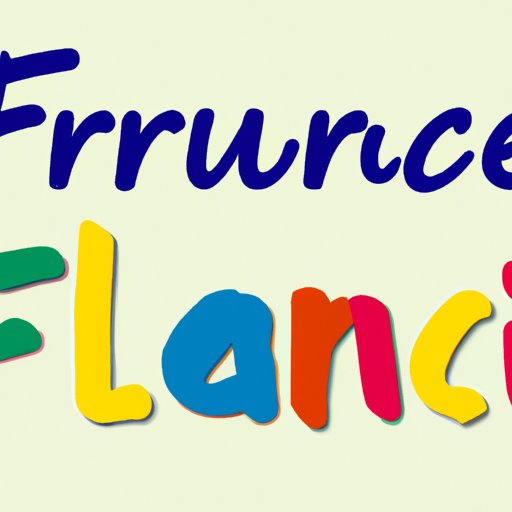
Introduction
When traveling to France or communicating with French people, expressing gratitude is an essential part of everyday communication. However, saying thank you in French can be tricky for non-native speakers, and getting it wrong can lead to misunderstandings. This comprehensive guide aims to provide you with all the information you need to say thank you in French confidently.
“Merci beaucoup”: A Brief Guide to Saying Thank You in French
The most common phrase for thank you in French is “merci,” pronounced “mehr-see.” It is a versatile expression that can be used in most situations, whether you want to thank a waiter, a friend, or a stranger.
You can also add “beaucoup,” which means “a lot,” to “merci” to emphasize your gratitude. “Merci beaucoup” is pronounced “mehr-see boh-koo,” and it’s a very effective way to express your appreciation.
It’s important to note that the level of familiarity between people can influence which phrase to use. While “merci” can be used in most situations, “merci beaucoup” may be more appropriate in a formal setting or with someone whom you don’t know well.
From Merci to Je vous remercie: Mastering the Art of Gratitude in French
If you want to take your gratitude to the next level, you can use expressions like “Je vous remercie,” which means “I thank you” and is pronounced “zhuh voo ruh-mehr-see.” This more formal phrase is ideal for business settings or when you want to show extra appreciation.
You can also use shorter variations of “je vous remercie,” like “je te remercie” (I thank you) or simply “merci bien” (thank you very much).
When using more formal expressions like “je vous remercie,” it’s crucial to use them correctly. You can use “je vous remercie” directly with the person you want to thank, but if you’re writing an email or a letter, it’s better to use “je vous prie de bien vouloir accepter mes remerciements” (please accept my thanks), which is more polite and respectful.
Saying Thank You in French: A Comprehensive Guide to Expressing Gratitude
Besides “merci” and “Je vous remercie,” there are many other phrases and expressions to show gratitude in French. Here are some examples:
- “Merci infiniment” (thanks infinitely)
- “Mille mercis” (a thousand thanks)
- “Grand merci” (big thanks)
- “Tout est parfait, merci” (everything is perfect, thanks)
- “Je suis reconnaissant(e) de…” (I’m grateful for…)
Each of these expressions can be used in different situations, depending on the level of formality and familiarity with the person whom you want to thank. For instance, “je suis reconnaissant de…” is a more formal and heartfelt way to express gratitude and may be more appropriate in a professional setting. Meanwhile, “mille mercis” is an informal and friendly way to say thanks, highlighting the joy and enthusiasm of expressing gratitude.
It is crucial to understand when to use each phrase since misusing or overusing it can lead to awkward and misunderstood conversations.
The Cultural Significance of Merci: Understanding How to Say Thank You in French
Expressing gratitude is an essential part of French culture, and saying thank you can often be seen as a sign of respect, appreciation, and kindness. French culture values the exchange of polite phrases and demonstrating an overall sense of appreciation.
However, there’s also an unwritten rule of staying courteous and avoiding overly expressing heartfelt emotions in social interactions. Being too expressive is seen as impolite or awkward behavior. So, keep this in mind to avoid misunderstanding.
How to Impress Locals While Traveling in France: Basic Phrases for Saying Thank You in French
If you’re planning a trip to France, you might want to learn some basic thank-you expressions to make the locals feel appreciated. Here are some of the essential phrases for expressing gratitude when traveling in France:
- “Merci” (thank you)
- “Merci beaucoup” (thank you very much)
- “C’est gentil” (that’s kind of you)
- “Je vous remercie” (I thank you)
- “Merci de votre aide” (thanks for your help)
Using these simple expressions not only shows appreciation to the locals but also helps to culturally identify with the French people. You can use these expressions while ordering food, buying souvenirs, or even while asking for directions. Remember- in France, manners take priority in interactions. It shows a considerable amount of respect when a foreigner goes to great lengths to learn and show appreciation for French customs.
Conclusion
Expressing gratitude is essential in French culture, and using the wrong phrase can sometimes make the situation awkward. Thus, learning how to say thank you in French confidently is crucial for anyone who wants to communicate effectively with French speakers. This article has provided a comprehensive guide, from basic expressions like “merci” and “merci beaucoup” to more formal expressions such as “je vous remercie.” It’s important to keep in mind the cultural significance of each phrase while showing appreciation while in France. Keep practicing and build upon a connection, friendly, and considerate nature overall, and show respect to the locals who go out of their way to help.





